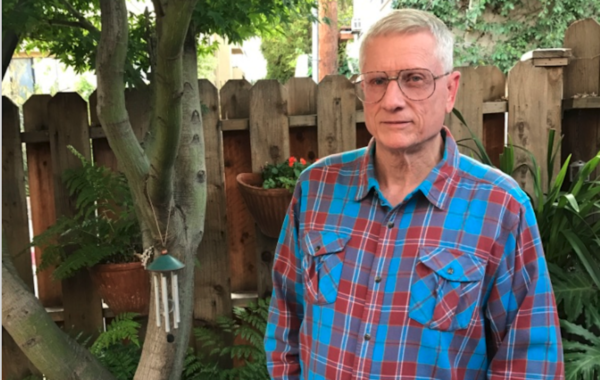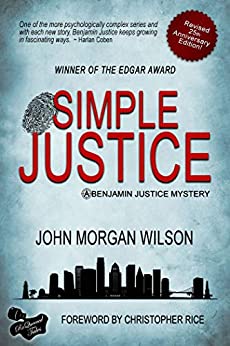
Editor’s Note: This interview by Steven Reigns was originally published by Lambda Literary, an organization that supports LGBTQ books and authors.
In 1996 John Morgan Wilson broke into fiction writing with. Simple Justice, a gay-themed mystery novel that, unusual for its time, received national attention, ranging from a vicious pan in Publisher’s Weekly to a selection by People as the magazine’s Beach Book of the Week, and then won a ground-breaking Edgar Award.
Set in and around West Hollywood, Wilson’s whodunit featured a volatile ex-reporter ravaged by grief, ruined by a Pulitzer scandal, and drawn from seclusion into the investigation of a murder with racial overtones outside a gay bar in LA’s Silver Lake neighborhood. Following in the footsteps of pioneering gay mystery writers Joseph Hansen and Michael Nava, Wilson veered in another direction, portraying his troubled lead character with unusual sexual and emotional frankness. Its release by major publisher Doubleday, in a four-book deal, was a possible sign that mainstream publishing might be broadening its scope regarding darker, grittier LGBT genre fiction.
The next year Mystery Writers of America honored Simple Justice with an Edgar Allan Poe Award for Best First Novel, reportedly the first Edgar given to a gay-themed novel written by an openly queer author. The Lambda Literary Foundation added a nomination for Best Gay Men’s Mystery, the first of six Lammy nods for the Benjamin Justice series during its eight-book run, three of them winners.
After St. Martin’s Press published the last four titles, and Bold Strokes Books reprinted the first four, Wilson’s mysteries gradually went out of print. But in September, Simple Justice. found new life in a revised, 25th anniversary edition, with a Foreword by Christopher Rice, available in ebook and paperback formats from ReQueered Tales.
Established in 2019, ReQueered Tales (RQT) plans to publish. the remaining Benjamin Justice mysteries over the next few years, in keeping with its mission to rescue post-Stonewall LGBTQ classics, which already include books by Robert Ferro, Felice Picano, Stan Leventhal, Grant Michaels, Nikki Baker, Lev Raphael, Brian Bouldrey and others.
Wilson, a longtime West Hollywood resident, recently discussed the revival of his books and what it was like to revisit Simple Justice a quarter century after its initial publication.
Q. You’ve made fairly heavy revisions to Simple Justice, so it’s not exactly a reprint. What prompted that?
A. Except for passages at public readings, I hadn’t read the entire book since galley proofs in 1996. As I turned the pages again last year, I was shocked by how sloppy some of the writing was, not to mention errors of fact, plot inconsistencies, and creative choices that caused me to cringe. I began my edits with wholesale trims, always a good place to start. I cut two minor subplots and two characters and added a new character I felt strengthened the story. Also, more background detail to sharpen time and place. It entailed months of hard work and several new drafts. Facing deadlines, I had to finally accept that it would never be perfect or even close to that, and let it go.
Q. Much of your work was done during the early months of the pandemic and the BLM resurgence. Did that influence your revisions?
A. Simple Justice is set in 1994, a pivotal election year amid rising violent crime, the peaking AIDS epidemic, equal rights activism, and a plethora of other issues, so there were definitely parallels between then and now. I found myself thinking more about race, identity issues, the emotional impact of AIDS, the struggle of women when men controlled so much of the conversation and the unwritten rules. Two characters in particular drew my attention: the Senator’s beguiling son, who I felt needed more weight and clarity to carry his role, and Alexandra Templeton, the young black reporter who partners with Justice on the murder investigation while trying to unravel his dark past and the cause of his career-wrecking meltdown. This time around I felt her developing differently, demanding more respect from me as an author. Nothing major, mostly nuance, a lot of it in the interplay of dialogue. I’m pretty sure the current environment guided that to some degree, whether I was conscious of it or not.
Q. You’ve said before that ReQueered Tales came along at just the right time. How so?
A. About three years ago, Atlanta author. Jon Michaelsen contacted me about an interview for his blog. When he learned that the last of my Justice mysteries were close to being out of print it became a discussion point among members of his LGBTQ crime fiction Facebook group. At that point, I figured the series had run its natural course. I was content with a lower profile, writing short fiction, and wasn’t keen to take on the challenges of self-publication. But several members of the group volunteered their specialized skills to help me navigate the digital and business worlds to bring the books back.
It was incredibly generous but I was skeptical at first. I was in my early seventies and it seemed a gargantuan task. Over time, though, their groundwork evolved into a full-fledged, royalty-paying publisher, dedicated to preserving selected older LGBTQ fiction. RQT’s principals include Justene Adamec, Alexander Inglis and Matthew Lubbers-Moore, but it all started with Jon, who’s taken on a consultant’s role. They will have at least thirty titles released by the end of 2020 and forty more planned for 2021. RQT’s success is a remarkable story all by itself.
Q. In the past, you’ve described Justice as your darker, more reckless alter ego. What was it like to inhabit him again after all these years?
A. Painful, exhausting, exhilarating. He’s not an easy guy to live with. Abrasive, angry, opinionated, sometimes violent, maddeningly introspective, prone to self-pity, but at least aware of it. In the end, it was an opportunity to explore his troubled personality again and, hopefully, portray him more effectively. It’s a first-person narrative, so his voice is crucial. If that doesn’t engage, nothing else works.
Q. Do you see West Hollywood differently now?
A. During my revisions, I had a sense of creating a time capsule of a West Hollywood that no longer exists. It was a lively place for sure in 1994, though not without its problems, AIDS and gay-bashing among them. But today it’s overrun with visiting hordes that dwarf the old crowds, with all the clamor, alcohol, drugs, crime, trash, vomit, urine and commercial signage that suggests, at least before the pandemic closed the show. The city’s commitment to social and political causes remains strong. But its current direction seems shaped as much by developers and other commercial forces as the cultural and political sensibility that infused the community in earlier years. Or maybe I’ve just gotten old and fussy, and it’s time to shuffle off to the desert.
Q. It’s no secret that Simple Justice was originally published to mixed reviews. As a first-time fiction author, how did you process that?
A. I was 50 when. Simple Justice was published, with hundreds of articles and a nonfiction book behind me, subject to keen editorial and public scrutiny, so I had a pretty tough hide by then. I appreciated the value of useful feedback and read the reviews of my first novel hungry for that. What rankled me were the snarky, arrogant broadsides, often from reviewers who’d never accomplished much as writers themselves.
A particularly venal review appeared in Publisher’s Weekly, getting a key plot point wrong that put Benjamin Justice in a “brutal relationship” with a “sexually confused” teenager he actually never met in the course of the story. In his Foreword, Christopher Rice refers to it as “a jaw-dropping distortion.” I can live with a reviewer slamming my work; it comes with the territory. But lazy reading and getting crucial facts wrong in a review is inexcusable. That damaging review, by the way, is still posted, uncorrected, in a PW permalink.
Q. Some readers were unhappy about your explicit depictions of sex, and it was reportedly an issue among the Edgar judges. Did you factor that in during your revisions?
A. When I mailed off the manuscript to my agent in 1995, I realized certain scenes would test the comfort level of readers accustomed to tamer crime fiction. But I considered sex and sensuality integral to a story that was pungent in general, and tiptoeing around or sanitizing those passages would have felt false to me.
Justice is a complex, passionate, full-blooded man. His sexual fantasies and behavior are part and parcel of who he is, for better or worse. The steamiest scenes flowed from his interactions with a character who had a rightful place in the narrative. Emasculating the two men to court mainstream tastes or spare delicate sensibilities never occurred to me, and Doubleday never asked me to tone anything down. As someone who grew up absorbing the moral judgment and outright hatred heaped on us for who and how we love, I let my story play out in a way that felt authentic to me, rather than constrained by any internalized shame or the double standard that allows heterosexual authors more creative latitude.
Obviously, it’s a choice each writer has to make, for creative or commercial reasons, and for the material at hand. In the end, our writing reflects who we are, and we have to live with it.
Q. You’ve been a journalist for five decades, and you tap that experience in your Justice novels. Do you miss working at it full time?
A. Not the grind, but it’s in my blood. In my sleep, I sometimes dream I’m writing a piece on deadline I’m unable to finish. I still jot notes on article ideas I’ll never pursue. When I left for college at 17, a rather lost kid without ambition or clear goals, my high school wrestling coach suggested I’d become a writer. It rattled me, but in a good way.
Two years later, a college dropout, I broke into reporting for my local paper, and was hooked. Even though I was a staff editor for a significant stretch at the L.A. Times, I retained my freelance status as a writer, because of the flexibility and freedom it provided. I was lucky enough to catch the last glorious years of newspapering as the ominous Internet loomed. We get a sense of that through Justice and the terrible guilt he feels for fabricating a story that won a Pulitzer, destroying his career and damaging a beloved editor in the process. I ached for him as I wrote those scenes. In a sense, I still live in that world through him, as he tries to atone.
Q. Since previous readers of Simple Justice already know “whodunit,” will they be interested in spending time with it again?
A. When I started this massive rewriting project, eight books in all, I couldn’t remember most of the plots and secondary characters. Even major twists and endings had faded over time. I suspect that’s also true of many readers. I know that some readers reread the Justice books, because I hear from them now and again. I certainly hope to find new readers, perhaps even globally, but also previous readers who might want to connect with Justice again and see what’s changed.
Q. Any chance you’ll ever write a new one?
A. I would never say never, except on my deathbed. (And maybe not even then.) At the moment, though, my focus is on fixing what I can in the second book, Revision of Justice, which is due out from ReQueered Tales next year.

